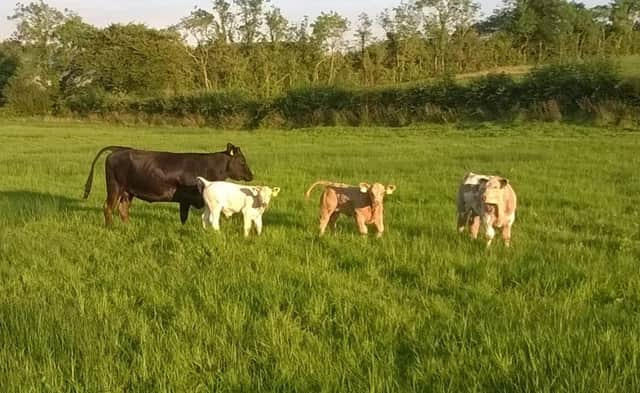DAERA Management Notes: Beef and sheep


On arrival house or yard sheep away from your own. As soon as possible drench them with 4-AD or 5-SI wormer and inject with moxidectin (1%) which also removes any sheep scab threat. After 24-48 hours turn them out onto pasture that has carried sheep in the current season and keep isolated for at least three weeks.
Ewe management pre-tupping
The target body score at tupping for lowland ewes is 3.0-3.5 and 2.5-3.0 for hill ewes. Assess body scores every three weeks. It takes three to five weeks on good grass (2300 kg dry matter per hectare cover or 7 cm high) to put on 0.5 body score or, in terms of live weight, one condition score equates to approximately 12% of the ewes live weight. Management of ewes by condition score should therefore be carried out by now! It is important to monitor this as different ewes within batches will gain/lose condition at different rates. Carry out all ewe preparations for tupping, including veterinary treatments, at least three weeks before mating.
Silage
Advertisement
Advertisement
In northern and western areas unless things have changed dramatically from the time of writing, many stock will be housed earlier than normal. If this is the case, silage analysis is a useful tool for accurate feeding, especially after a poor summer when cutting conditions were less than favorable for many, resulting in variable silage quality. Calculate how much silage you have and how much you need. An Online Calculator is available at: https://eservices.ruralni.gov.uk/onlineservices/tools/Beef/silovol.asp.
BEEF: Autumn calving - On many farms autumn calving will now be well under way.
Close observation is needed with these cows both pre and post calving. Large calf sizes are often associated with autumn calving and assistance may be required. Once calved, cows can go down with magnesium deficiency, especially if they are on silage aftermaths with changeable weather or other stress triggers which could very well be the case this year. On good aftermaths an abundance of milk and mastitis could also be a problem, especially with very young calves.
Weaning spring born calves
Producers are finding that leaving the calves in the field they have been in all summer and taking away their mothers helps reduce the weaning check. Removing a mother and changing the environment all at once is a big change. Many farmers have their own methods which include the following:
Advertisement
Advertisement
l Simply swapping the cows over between two groups and leaving the calves in their original field. This gives both the calves and cows ‘social’ company even if they aren’t mother and calf. Ensure the two fields are not within ‘sight’ or ‘hearing’ of each other. In addition leaner cows can benefit from the higher level of nutrition provided to the weaned calves.
l Stagger pulling out cows; this allows those calves weaned to still have the presence of other cows.
l Using nose flaps or other methods to prevent suckling while still having the social bond with their mothers for a period before separation.
You may find these efforts over the top; however weaning is the second most stressful time of an animal’s life, when its immune system is compromised and it also coincides with the start of the pneumonia season.
‘SureCalf’ scheme
Advertisement
Advertisement
Due to the good response from sellers and buyers, suckled calves that have been vaccinated against three of the main respiratory pneumonia viruses will again be available for sale under the ‘SureCalf’ scheme at Ballymena and Enniskillen markets. Vaccinated calves will have distinctive blue tags and certificates will be available for buyers at the sale. If you wish to take part in the scheme, contact Patrick MacFarlane (07802 596 813) or Aurelie Moralis (07557 076 104).